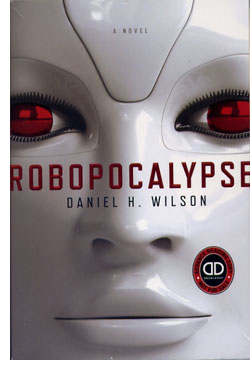 |
 |
 Daniel H. Wilson
Daniel H. Wilson
Robopocalypse
Reviewed by: Rick Kleffel © 2011
Doubleday / Random House
US Hardcover First Edition
ISBN 978-0-385-53385-0
Publication Date: 06-07-2011
351 Pages ; $28.95
Date Reviewed: 06-01-2011
Index:
Science Fiction
Horror
General Fiction
It is not a book of rocket science, and for that we can be thankful. The title pretty much gives away the game; 'Robopocalypse' is clearly going to be a novel in which robots wage war against humanity. This is the worst-case scenario for the Singularity. There are no happy mutants here. On the first page, the war has ended, and we meet Cormac "Brightboy" Wallace as he is attacked by a swarm of explosive robotic beetles. Readers might well think it's not going to be pretty.
It's not, but 'Robopocalypse' is as gripping as you could hope it to be and filled with imaginative scenes of robot-versus-human mayhem. The real shock is how affecting this novel is. For all the fantastic and detailed imaginations of technology gone wild that frame the story, 'Robopocalypse' has, at its heart, many hearts, most of them human, all them laid bare in precise, fine prose that gives the novel an emotional wallop. The machines may have decided that we need to be (mostly) eliminated, but we made these machines. They are bringing about an end to civilization as we know it, and they are no less than mirrors of their makers.
Because it deals with the end of the world, 'Robopocalypse' has a global focus, which sounds a bit like an oxymoron; how can you focus on everything? Well you can't, but in order to get the right scope, Wilson carefully builds a huge cast of characters in short chapters. This is a pretty big challenge that he easily manages. From American grunts in Afghanistan (yes, we still have men there in his not-so-near future) to an elderly Japanese bachelor living with a humanoid companion robot, to a British phone phreak, to the Osage nation, Wilson picks and chooses well. The characters who tell this story are our anchors; we want them to survive, even if not all of them are (entirely) human.
The plot here, while quite straightforward, is certainly well handled. For all the great technological insight he brings to the novel — Wilson is a roboticist, so he knows his stuff — what we have here is a horror novel, and in that sense, it's extremely creepy and effectively terrorizing. Framed by a nice before-and-after device, the action begins when a powerful AI escapes into our networked world. In the months that follow, there are many hints that things are going awry, and these early scenes are easily as effective as the bigger scale set pieces that follow.
The big-scale scenes, as well as the smaller ones, are written in the same fine prose that makes Wilson's characters so involving. Wilson has a great sense of setting up his characters and location, then just lets things rip long enough to give us a sense of how bad it can be. He doesn't go into too much technical detail. He keeps his focus on the emotional experience of the humans.
Wilson's storytelling style is pretty complicated. Each chapter has opening quotes, sometimes from characters you've not yet met, and they close out with hints of what is to come, often explaining why what you've just read is important. It's the kind of stylistic turn that could easily backfire, but Wilson is so terse and focused on his characters, that these pointers — part of an attempt by both humanity and its robotic foes to put together a picture of what happened — work well. They enable Wilson to keep his eyes on the twin prizes of this book; great characters and non-stop, well-written, imaginative scenes of robotic mayhem.
Part of the reason that this works as well as it does is that Wilson has clearly built up a huge underworld of robotic development, both before and after the "Precursor virus" takes hold. He could probably write a non-fiction book about the science behind this one. Fortunately, he resists the temptation to include any of that book in Robopocalypse.' For all the obvious work the author did in creating a technological back story and backdrop, we hear very little about the technology. Instead, we see the end result from the human perspective, and we get that vision, entirely.
'Robopocalypse' bucks the current trend of happy or incomprehensible singularities in science fiction. It's very old school in this regard, which might be a problem if Wilson were less technically savvy or less focused on his characters. This is the robot uprising we all worried about. In some ways, it's what we expected, but Wilson is smart enough to surprise us with his imagination and engage us with his characters. 'Robopocalypse' is all good parts with good characters, most of whom are mostly human. You'll look twice at any programmable appliance you have after you finish reading this novel, and wonder if what you are looking at might instead be a mirror.
|
 |
|
|
 |
| |
Review Archive
All Reviews alphabetized by author.
General Fiction
Non-Genre, general fiction and literature.
Horror
Supernatural fiction, supernatural horror and non-supernatural horror.
Science Fiction
Science fiction, science fantasy, speculative fiction, alternate history.
Fantasy
Fantasy, surrealism and magic realism.
Mystery
Crime, thrillers, mystery, suspense.
Non-Fiction
Non-Fiction, True Crime, Forteana, Reference.
Poetry
|
|
 |
|




